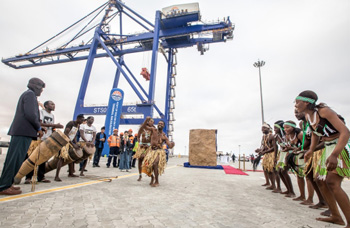
Geingob briefed on key geopolitical and macroeconomic developments by top central bank execs

The President HE Dr Hage Geingob was recently briefed on the key geopolitical and macroeconomic developments as well as an update on the country’s progress with the execution of the Action Plan to address the Financial Action Task Force’s (FATF) Anti-Money Laundering and Combatting the Financing of Terrorism and Proliferation (AML/CFT/CPF) Mutual Evaluation exercise by a team of executives from the central bank.
The Governor of the Bank of Namibia, Johannes!Gawaxab, accompanied by Deputy Governor Ebson Uanguta and Deputy Governor Leonie Dunn paid the courtesy visit for the engagement, the central bank announced in a statement.
Furthermore, during the visit, the Bank also updated Geingob on the Bank’s strategic initiatives and its implementation to address financial inclusion in rural areas and the informal economy.
The briefing commenced with an overview of the current global geopolitical and macroeconomic landscape. The global economy is witnessing notable fault lines, including the ongoing Russia/Ukraine conflict and escalating tensions between the US and China.
According to the executives, inflation remains a concern, posing challenges for monetary authorities
globally. Similarly, Namibia has experienced slightly elevated inflation, primarily driven by
food and housing prices.
In response, the Bank has taken appropriate though unpopular decisions to raise interest rates to counter inflationary pressures while safeguarding the one-to-one link between the Namibia Dollar and the South African Rand.
Acknowledging the challenges faced by households and businesses, the central bank together with the Ministry of Finance and Public Enterprises relaunched the SME Economic Recovery Loan Scheme. With the relaunched scheme over N$ 187 million has been disbursed to more than 200 (two hundred) SMEs across the country, allowing them to continue operating and maintaining existing employment.
Additionally, the Bank of Namibia has extended relief measures to cushion households
and businesses until April 2024, through commercial banks with N$5.8 billion in approved
loans under the moratorium.
In terms of the domestic economy, the executives said Namibia witnessed strong growth of 4.2% in
2022, however, is projected to moderate to 3% in 2023 due to slower growth in primary and secondary industries.
According to the executives on AML/CFT/CPF efforts, Namibia has taken measures to address the findings of the 2022 Mutual Evaluation. Namibia’s compliance with AML/CFT/CPF obligations is
assessed every five years by the FATF. To mitigate the risk of a targeted review and Grey Listing by the FATF, Cabinet approved a National Action Plan in December 2022.
“To this end, positive progress has been made with the approval of twelve Amendments to current
Acts and two new Bills demonstrating Namibia’s commitment to align with international AML/CFT/CPF obligations and to effectively mitigate national ML/TF/PF risk exposure,” they added.
Meanwhile, recognizing the need for enhanced financial inclusion, the Bank has incorporated this
objective into its Strategic Plan for 2022-2024. While Namibia has achieved broad financial inclusion, access to affordable financial services remains limited in rural areas and the informal sector.
The central bank aims to improve this situation by promoting affordable, interoperable, fast, and cost-efficient payment services to reduce reliance on cash and enhance the efficiency of financial services. To this end, the Bank has initiated strategies to enhance the uptake of cost-efficient payment services and reduce dependence on cash.
In his concluding statements, Governor !Gawaxab expressed: “The Bank of Namibia wishes to re-affirm the institution’s commitment to supporting Namibia’s economic development and promoting financial inclusion and economic stability. The Bank is ready and willing to work closely with its key stakeholders to navigate the prevailing complexities that exist within the global and domestic economy and promote sustainable growth in Namibia.”













































